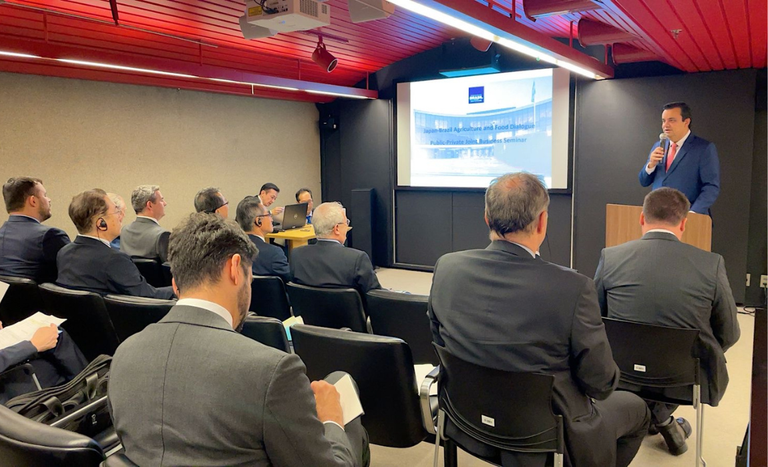Notícias
BILATERAL RELATIONS
Mission of the Ministry of Agriculture to Japan strengthens bilateral relations and explores new export opportunities
From May 21 to 25, a delegation from the Ministry of Agriculture and Livestock (Mapa) embarked on an official mission to Japan. The mission included high-level meetings and commercial promotion events aimed at strengthening bilateral relations, promoting Brazilian exports, addressing sanitary and phytosanitary issues, and exploring cooperation opportunities between the two countries.
The mission began in Tokyo with a preparatory government meeting for the "Brazil-Japan Dialogue on Food and Agriculture" with the Ministry of Agriculture, Forestry, and Fisheries of Japan (MAFF). Topics such as food security and technological cooperation were discussed. This dialogue is the primary forum between the agriculture ministries of the two countries and is scheduled to take place in Brazil in the coming months.
Leaders from Mapa, the Ministry of Foreign Affairs, private sector associations, and Brazilian entrepreneurs also met at the Brazilian Embassy in Tokyo with members of the Japanese government and private sector to discuss trade expansion and investments aimed at increasing Brazilian agricultural production. The meeting included 60 representatives from both countries.
During the meetings, which included an audience with the Brazilian Ambassador to Tokyo, Octávio Henrique Côrtes, opportunities for exporting beef and pork to Japan were presented. It was highlighted that Brazil currently holds the status of a country free of Foot-and-Mouth Disease (FMD) without vaccination, an essential condition for exporting to the Japanese market. The only remaining step is to obtain recognition from the World Organization for Animal Health (WOAH).
Additionally, discussions included the potential for Brazil to export oils, fats, flours, animal-derived hemoproducts, mixed sausage, avocado, melon, and other agribusiness products to Japan.
The Brazilian delegation also conducted technical visits to the Yamazaki rice fields, the National Agriculture and Food Research Organization (NARO), and the Japan International Research Center for Agricultural Sciences (JIRCAS), reinforcing their commitment to innovation and research in the agricultural sector.
COMMERCIAL PARTNERSHIP
In 2023, Brazil's agricultural exports to Japan totaled $4.1 billion. The export portfolio is mainly concentrated on five products, which represent about 70% of the total exported: corn (35%), fresh poultry meat (23%), green coffee (10%), soybeans (8.3%), and soybean meal (6%).
Japan is the fourth-largest importer of agricultural products in the world, with Brazil being the main supplier of some items such as fresh poultry meat, which accounted for 74% of Japanese import value last year, green coffee, and orange juice.
JICA COOPERATION
During the mission, advancements in the National Program for the Conversion of Degraded Pastures (PNCPD) were also discussed. Japan, through the Japan International Cooperation Agency (JICA), will be the first to contribute to the program, which aims to recover up to 40 million hectares of pastures over the next ten years, doubling Brazil's food production area without deforestation.
The cooperation with JICA will proceed along two lines: Financial Cooperation, providing funding for agricultural producers, and Technical Cooperation, which will define the regions and properties targeted by the program. Aspects such as research, development, and innovation will be addressed, with interest rates between 1.7% and 2.4% in Japanese yen, payment terms between 15 and 40 years, and grace periods between 5 and 10 years. The financial modeling and initial report will be discussed, with an official announcement expected at the G20 summit in November.
MAPA DELEGATION
The Mapa delegation included the Secretary of Trade and International Relations, Roberto Perosa; the Secretary of of Plant and Animal Health and Inspection, Carlos Goulart; the Deputy Secretary of Trade and International Relations, Julio Ramos; the Director of the Department of Non-Tariff Negotiations and Sustainability, Augusto Billi; the Director of the Department of Animal Health, Marcelo Mota; and the Agricultural Attaché in Tokyo, Marco Pavarino.
“The official mission to Japan was a significant moment in consolidating bilateral relations and expanding Brazilian agricultural exports. Discussions on food security, technological cooperation, and market access reinforce our commitment to innovation and sustainability. The collaboration with JICA on the National Program for the Conversion of Degraded Pastures is a clear example of how international partnerships can drive the development of Brazilian agribusiness, benefiting producers and consumers in both countries,” emphasized Secretary Roberto Perosa.
Press Information
imprensa@agro.gov.br


